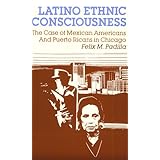
Average Reviews:

(More customer reviews)Are you looking to buy Latino Ethnic Consciousness: The Case of Mexican Americans and Puerto Ricans in Chicago? Here is the right place to find the great deals. we can offer discounts of up to 90% on Latino Ethnic Consciousness: The Case of Mexican Americans and Puerto Ricans in Chicago. Check out the link below:
>> Click Here to See Compare Prices and Get the Best Offers
Latino Ethnic Consciousness: The Case of Mexican Americans and Puerto Ricans in Chicago ReviewFelix Padilla's 1985 classic stands as the first and,even today, one of the few social science studies on the dynamics and formation of a pan-Latino ethnic identity. Padilla's study is set in Chicago and examines the structural conditions and social inequalities endured by Chicanos and Puerto Ricans in the Windy City throughout the 1950s, 60s, and 70s; these inequities fostered the emergence of a new Latino ethnic identity and mobilization in the 1970s that transcended individual Mexican and Puerto Rican identity.Padilla contends that a pan-ethnic Latino identity emerges when two or more Spanish-speaking ancestry populations are confronted with similar social conditions (such as poverty, discrimination, or poor educational facilities). Such conditions may serve as a basis for solidarity and unity between two or more Spanish-speaking groups (in this case Chicanos and Boricuas) as they unite to seek redress for such grievances. As the old saying goes, "there is strength in numbers."
Padilla points out that there are two basic models of Latinismo: the ascribed model and the emergent model. The ascribed model seeks ethnicity as a primordial category; Latinos constitute an a priori ethnic group based on Spanish as a cultural commonality. On the other hand, the emergent model and its adherents see Latino pan-ethnicity as a socially constructed concept that arises when Mexicans, Puerto Ricans, Dominicans, etc unite in efforts to challenge systematic inequalities that they face. Padilla clearly favors the emergent model, although he does not totally discard the ascribed framework - pointing out that many "Latinos" cherish Spanish as a key element of symbolic ethnicity.
Padilla does a great job in detailing the emergence of a pan-Latino ethnic identity among Chicanos and Puerto Ricans in Chicago during the 1970s. The move towards a pan-Latino identity originated in the early 1970s when Mexicans and Puerto Ricans unitied to challenge discrimination in Chicago's white collar employment sector. Federal affirmative action policy enhanced efforts towards pan-Latino unity as it legitimized and confirmed claims of inequality and discrimination. The sucess of early efforts in opening up new job opportunities for Mexicans and Puerto Ricans was taken as proof that pan-Latino unity held promise in fighting racial and ethnic discrimination.
Padilla's book is important because, all too often, larger American society uses the label "Latino" indiscriminately - implying that Mexicans, Puerto Ricans, Cubans, Dominicans, etc. are automatically a unified, homogenous group. Nothing could be further from the truth. A homogenous "Latino" culture does not exist, cultural differences and differences in historical experiences mark each group that is encompassed under the rubric of "Latino." Examing the experiences and social history of, for example, Puerto Ricans and labeling it as "Latino culture" or "Latino history" is misleading and a misnomer, as Puerto Rican experience in the United States is vastly different from Cuban experiences and Chicano experiences. Padilla argues that social scientists and the media must stop using the label "Latino" indiscriminately and realize that this pan-ethnic label is a political phenomenon that denotes a conscious attempt at inter-group unity to achieve a collective goal. As such, scholars should dedicate themselves to investigating the factors and conditions that serve to promote attempts at "Latino" unity.
I strongly suggest reading this book in conjunction with "Latino Crossings" by Nicholas DeGenova and Ana Ramos-Zayas. While Padilla focuses on the conditions that foster pan-Latino unity, DeGenova and Ramos-Zayas examine factors that impede and prevent such unity (inter-group prejudice and stereotypes being the main culprit to such efforts).Latino Ethnic Consciousness: The Case of Mexican Americans and Puerto Ricans in Chicago Overview
Want to learn more information about Latino Ethnic Consciousness: The Case of Mexican Americans and Puerto Ricans in Chicago?
>> Click Here to See All Customer Reviews & Ratings Now
0 comments:
Post a Comment